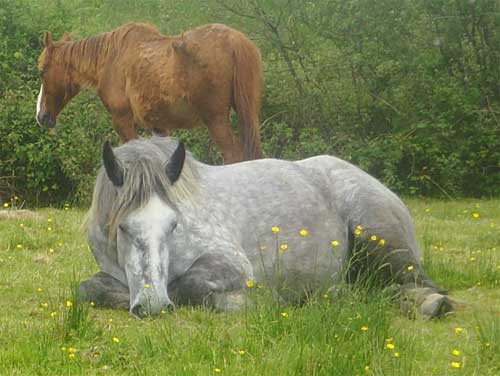 Most horses eventually get old. Okay, actually the statistic is somewhere
like %100 of animals eventually age and become older. It’s just a fact of life, but even with this
inevitability, have you prepared yourself to care for an elderly horse? Have you taken any steps to teach
their specific condition differently than a young one? The longer you wait, the older your horse will
become, so take some time and consider how to properly care for an older horse.
Most horses eventually get old. Okay, actually the statistic is somewhere
like %100 of animals eventually age and become older. It’s just a fact of life, but even with this
inevitability, have you prepared yourself to care for an elderly horse? Have you taken any steps to teach
their specific condition differently than a young one? The longer you wait, the older your horse will
become, so take some time and consider how to properly care for an older horse.
Thankfully for both us and our horses, they can prove to live quite a long
time. The average lifespan for a horse is 25 to 30 years where around 20-years-old you’ll really see the
effects of age kick in. Still, becoming elderly isn’t a death sentence, though it should be noted that a race
horse or other sort of horse that’s lived a high-impact life will have a longer life expectancy and entirely
different problems when they get older.
The big indicators of reaching “elderly” status are grey hairs appearing
around the eyes, muzzle, and forehead, a sagging topline, or prominent withers. You may also notice cataracts
developing in their eyes. Of course, arthritis will become a major issue as well, though that isn’t necessarily
exclusive to old age.
Not all signs of aging are exclusive to the visible either. The older a horse
before, the less effective their immune system will be, same with all their internal organs such as their heart
and liver. Muscles loose much of their elasticity and become stiffer and less powerful. Bones get weaker and
far more brittle. Your horse may even have difficulty eating either because they just don’t feel up to it or
their jaws are sore.
Strangely, one of the most important things to do with an older horse is to
use the kid gloves, so to speak. You can’t run or work them as hard anymore because they’re past their prime.
They won’t be able to carry as much weight or walk as far anymore, so plan accordingly and give them a break
when necessary.
Also, make sure to increase how regularly they are sent to the vet. Have their
teeth inspected at least twice a year or more to check for problems there. Generally be more aware of
everything going on with them. Don’t treat everything they do as an indicator that something serious is wrong,
but certainly don’t neglect to look into any odd behaviors they are displaying.
With their new stage of life, their diet also needs to change. Talk to your
vet and figure out what you should be supplementing their food with as some older horses require more fiber,
protein, or vitamins in general. No matter what, ensure that the food they receive is easy to chew and swallow
and is dust free. So, basically feed them healthy food rather than junk.
An old horse doesn’t have to be a sad horse. Taking the time to embrace their
age and celebrate it can go a long way to turn a few more years into 10. Treat them with respect and know what
they can and can’t still do anymore. Remain caring in your attitude and your can still live a long and happy
life.
Related Articles
Stable Building Tips
Bedding Pros and Cons
Mucking Out Your Horse's Stall
Feeding Your Horse
What To Feed Your Horse
Giving Up Your Horse
Horse Grooming
Do Horses Need Shoes?
Teeth and Horses
Winterizing Your Barn
Preparing to Travel With Your Horse
Winter Care for Horses
Preventing Barn and Stall Boredom
Tips for Traveling with Your Horse
Stable Requirements: Building
the Space to Meet Your Horses' Needs
Preparing Your Horse for Hot Weather
Tips for Maintaining Your Horse Trailer
Proper Hoof Care
Why Braiding Horse Hair is Beneficial to
Their Health
Tips for Taking Care of an Older Horse
How to Keep Your Horse Fed on a Budget
Transitioning Horses from Winter Feed to
Spring Feed
Why You Should Feed Your Horse Flaxseed
Dealing With an Unhappy Horse in Their
Stall